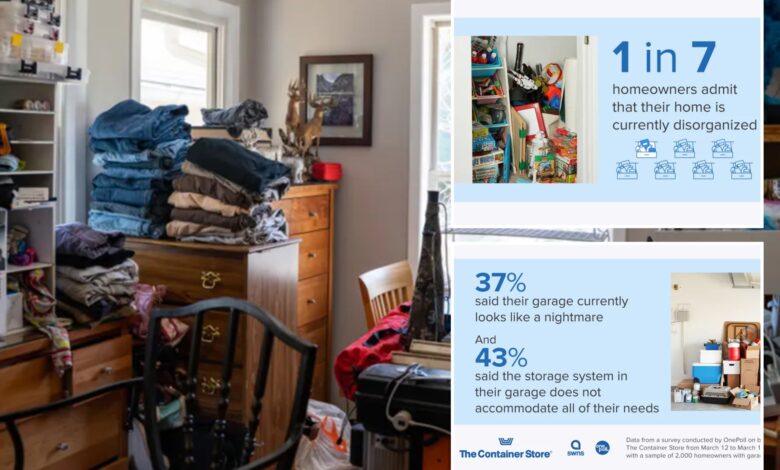Here’s how many homeowners are afraid of facing the clutter in their abodes

Forty percent of homeowners are afraid of facing the clutter in their homes, according to new research.
A survey of 2,000 homeowners with garages looked at how they deal with clutter and found that nearly a third of respondents have difficulty keeping their homes organized (29%).
Although 82% consider themselves to be an organized person, they’re feeling the mental load of keeping their home in check.
Nearly half of respondents said that the organization of their home has an impact on their mental health (48%) and 80% feel more motivated when their home isn’t cluttered.
Similarly, 73% expressed feelings of being overwhelmed when their home is untidy.
Many try to get ahead of this feeling, as 35% of those surveyed even claim to “very much” enjoy organizing, although a quarter feel the exact opposite (24%).
Conducted by OnePoll for The Container Store, the survey found that one in seven homeowners admit that their home is currently disorganized.
On average, homeowners have 25 things that are currently out of place in their homes, and of these respondents, half are putting off finding a spot for those items.
Where does the clutter live?
According to respondents, the most difficult storage areas of the home to keep organized are the garage (46%), closet (24%) and drawer(s) (20%).
The top items that are currently taking up the most space in Americans’ storage spaces are home and holiday decor (41%), old documents (34%) and clothes or shoes (29%).
With the abundance of “junk” in their home, 46% would feel embarrassed if guests saw the current state of these areas.
Unsurprisingly, those surveyed also named these areas as the most common places for “junk” to be stored (garage: 52%, in drawers: 34% and closets: 32%).
Thirty-five percent said it’s been at least a few months since they’ve organized the “junk” areas within their home, and another 23% have attempted to organize their garage at least a year ago.
“For many homeowners, the garage — like other classic ‘storage areas’ — can be an afterthought,” said Gretchen Ganc, executive vice president of strategy and analytics at The Container Store.
“There’s a world of potential within these spaces that can surprise you in terms of just how useful they can be. While you would ideally keep a handle on organizing the storage areas in your home before they get to the point of clutter that will only overwhelm you more, sometimes you have to tackle a space in your home where clutter has already taken over.”
The garage, particularly, is an area of concern for respondents, as 37% said their garage currently looks like a nightmare.
As a result, 21% of homeowners completely avoid going into their garages.
Even though respondents use their garage as storage for necessary items (60%) or for random things (58%), 43% said the storage system in their garage does not accommodate all of their needs.
“Garages are not ‘one size fits all,’ which is why we offer custom spaces and complementary organizing solutions that meet your specific needs,” said Ganc.
“To help figure out what kind of organizational system will work best for you, we suggest outlining your goals for the space: what do you need to store, what are you hoping to do with the space you free up and how can you maximize the space with which you have to work?
“Design services, like the ones we offer, can be helpful to map this out with you, or even for you. Additionally, our new Custom Spaces line, Garage+ by Elfa, maximizes space and solves storage challenges so you can love your Garage again.”
ITEMS TAKING UP THE MOST SPACE IN “JUNK” AREAS
- Home and holiday decor — 41%
- Old documents — 34%
- Clothes/shoes — 29%
- Small tools (e.g., screwdriver, wrench, etc.) — 25%
- Mementos/souvenirs — 25%
- Books/manuals — 22%
- Wires/cables — 21%
- Trinkets — 20%
- Cleaning supplies — 15%
- Photos — 13%
Survey methodology:
This random double-opt-in survey of 2,000 American homeowners with garages was commissioned by The Container Store between March 12 and March 19, 2024. It was conducted by market research company OnePoll, whose team members are members of the Market Research Society and have corporate membership to the American Association for Public Opinion Research (AAPOR) and the European Society for Opinion and Marketing Research (ESOMAR).




